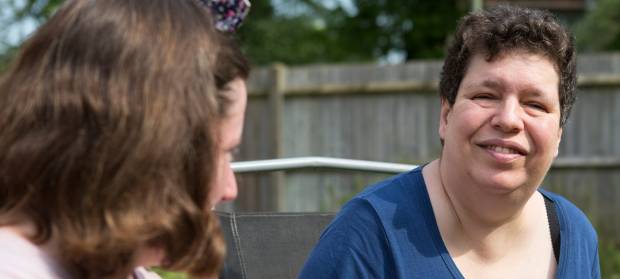Out of sight campaign
In 2011, BBC Panorama exposed the shocking abuse of people with learning disabilities at the now closed Winterbourne View hospital near Bristol.
Since then Mencap and the
Challenging Behaviour
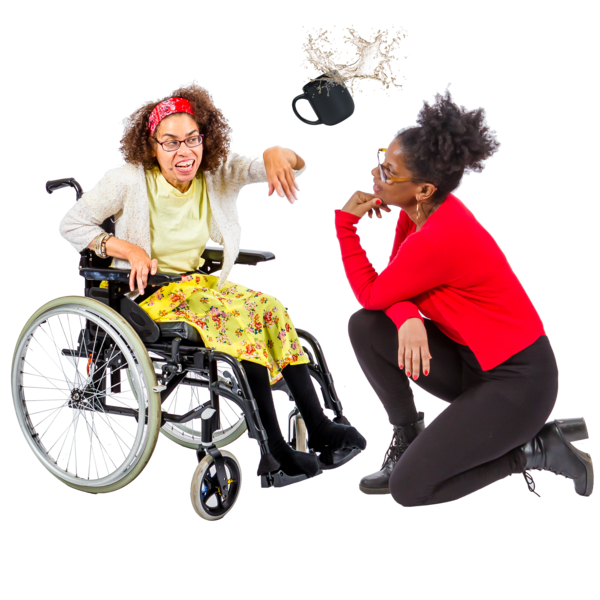 Challenging behaviour can be when someone hurts themselves, hits or pinches someone else, or breaks something. Some people might behave like this because they are upset or because people do not understand them.
Foundation have been working with families to help ensure people with a
learning disability
Challenging behaviour can be when someone hurts themselves, hits or pinches someone else, or breaks something. Some people might behave like this because they are upset or because people do not understand them.
Foundation have been working with families to help ensure people with a
learning disability
 A learning disability is to do with the way someone's brain works. It makes it harder for someone to learn, understand or do things.
are moved out of inpatient units and get the right care and support in their local communities, near family and friends.
A learning disability is to do with the way someone's brain works. It makes it harder for someone to learn, understand or do things.
are moved out of inpatient units and get the right care and support in their local communities, near family and friends.
What was Winterbourne View?
Winterbourne View was a privately run specialist hospital for the
assessment
 An assessment is a way of finding out what help a person needs. When you have an assessment, you might have to go to a meeting or fill in a form.
and treatment of people with learning disabilities,
autism
An assessment is a way of finding out what help a person needs. When you have an assessment, you might have to go to a meeting or fill in a form.
and treatment of people with learning disabilities,
autism
 Autism is a disability. Autistic people find it difficult to understand what other people think and feel. They also find it difficult to tell people what they think and feel. Everyone with autism is different.
and/or challenging behaviour.
Autism is a disability. Autistic people find it difficult to understand what other people think and feel. They also find it difficult to tell people what they think and feel. Everyone with autism is different.
and/or challenging behaviour.
Significant abuse and neglect of some of the people residing at Winterbourne View led to 11 members of staff being arrested and charged. There was a national outcry after the documentary was shown.
Read Mencap and the Challenging Behaviour Foundation’s Out of Sight report to find out about some of the people who have been stuck in similar places to Winterbourne View.
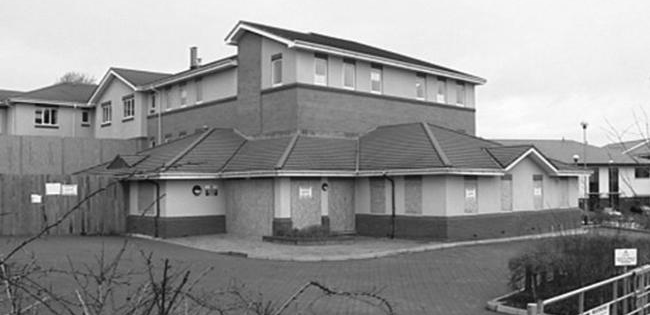
Since Winterbourne View
After the exposure of Winterbourne View, the government committed to a programme of work aimed at supporting people to move out of units and back to their local communities. The government promised the children and adults who were then in inpatient units would be supported to move back to their local communities by 1st June 2014.
This simply didn’t happen. The deadline passed with more people in inpatient units than before the promise was made. Read Winterbourne View: The Scandal Continues PDF to find out more about why we continue to fight for change. We have continued the fight alongside families of people in units, and those whose family members have been in before to ensure that no further promises are broken.
In 2015, The government committed to a new timetable. They published a 3-year action plan called Building the Right Support. In it, they promised to close 35-50% of inpatient beds for people with learning disabilities and ensuring the right support and services are developed in local areas, by March 2019.
This target was missed. They moved the target to March 2020 and said they would close 35% of inpatient beds by then. This target was missed too.
What's next? Getting real change
The government has been clear that hospitals are not homes and that people should get the right support in their
community
 A community is the people and places in an area.
but too many people remain in inpatient units where we know that they are at increased risk of abuse and neglect.
A community is the people and places in an area.
but too many people remain in inpatient units where we know that they are at increased risk of abuse and neglect.
The government has set themselves a new target to close 50% of inpatient beds by March 2024. This is in the NHS Long Term plan.
However, they have still not published an Action plan to say how they will make sure this happens. We need to know what is going to be different this time. How will they make sure the right community support is developed, including the right housing, support from care staff and professionals in the community with the right skills and expertise - to stop people ending up in inpatient units inappropriately and getting stuck.
There have been many reports that show the worrying lack of progress, and they all highlight the same issues. There can be no more excuses. This is a
human rights
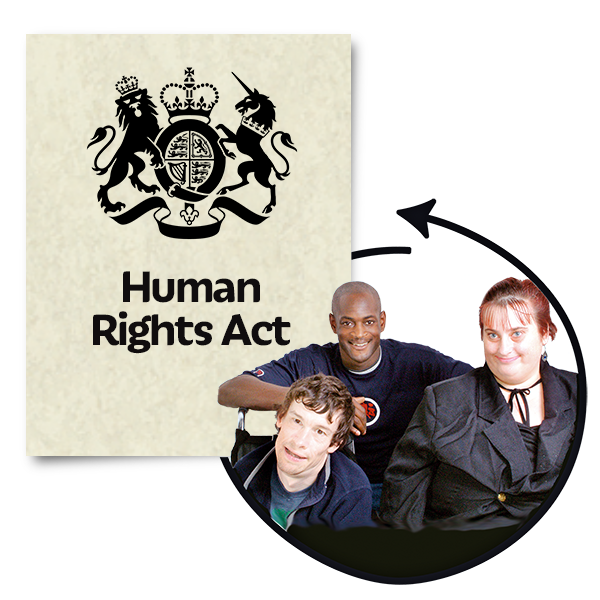 Human
rights
Human
rights
 Rights are the things everyone should be allowed to do like have a say, or go to school.
are the rights that everyone has. These include the right to go to school and the right to start a family.
scandal and it must stop.
Rights are the things everyone should be allowed to do like have a say, or go to school.
are the rights that everyone has. These include the right to go to school and the right to start a family.
scandal and it must stop.
Recent reports showing the worrying lack of progress and demanding change, include:
- Health and Social Care Committee inquiry into Treatment of autistic people and individuals with learning disabilities (2021) (PDF)
- CQC’s Out of Sight report (2020) (PDF)
- Joint Committee on Human Rights Inquiry into the detention of young people with learning disability and/or autism (2019) (PDF)
- Local support for people with a learning disability - National Audit Office report, 2017 (PDF)
- Transforming Care: Our stories - NAS report, support by Mencap and CBF, 2017 (PDF)
- Transforming Care: the challenges and solutions - VODG, 2018 (PDF)
Mencap and Challenging Behaviour Foundation are working with families and other organisations to keep the pressure on the Government and NHS England to ensure real change happens for people with a learning disability and their families.
Further resources
We have produced a series of Meeting the Challenge guides, in partnership with the Challenging Behaviour Foundation, Respond and Change, for people with a learning disability and families to help them understand their rights, in the community and in inpatient units.
We worked with the National Autistic Society and the Challenging Behaviour Foundation on some guides about getting involved in the work of local Transforming Care Partnerships (TCPs) and influencing decisions. Find out more and download the guides here.
We have also worked with the Challenging Behaviour Foundation (CBF) to develop a PDF resource for professionals about how to involve children and young people with severe or profound multiple learning disabilities about the support they receive. This is accompanied by
guidance
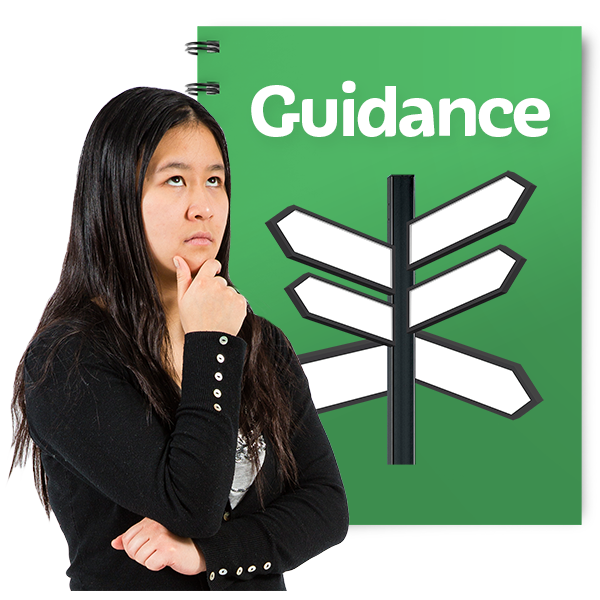 Guidance means being given clear instructions to be able to do something well.
for commissioners and providers about how to support families to keep in touch with their child if they are sent out of area.
Guidance means being given clear instructions to be able to do something well.
for commissioners and providers about how to support families to keep in touch with their child if they are sent out of area.
The CBF has also developed a resource on medication, as part of the NHS England-led STOMP programme: stopping the overmedication of people with a learning disability, autism or both, with psychotropic medicines. The resource is for family carers.
Further reading
- Building the Right Support PDF - a national plan (2015) (Easy Read PDF here)
- Building the Right Support Service Model PDF (2015)
- Care services for people with learning disabilities and challenging behaviour PDF - National Audit Office (2015) (Easy Read PDF here)
- Time for Change PDF - Sir Stephen Bubb (2014) (Easy Read PDF here)
- Learning Disability Census 2015, 2014, 2013 PDF
- Winterbourne View, A National Response PDF - Department of Health (2012) (Easy Read PDF here)
- Serious Case Review: Winterbourne View PDF - South Gloucestershire Council (2012) (Easy Read PDFhere)
- Making it Happen - a guide for campaigners (PDF) (Easy Read version here)
Download our guide for campaigners about taking action to get people with a learning disability and/or with challenging behaviour out of inpatient units
Download our
easy read
 Easy Read is a way of making written information easier to understand. Pictures are usually added next to the writing.
guide for campaigners about taking action to get people with a learning disability and/or with challenging behaviour out of inpatient units
Easy Read is a way of making written information easier to understand. Pictures are usually added next to the writing.
guide for campaigners about taking action to get people with a learning disability and/or with challenging behaviour out of inpatient units
